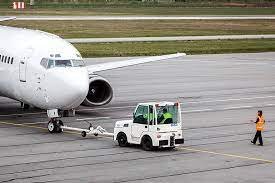
In the bustling environment of airports, where planes arrive and depart like clockwork, there exists a group of individuals who play a crucial yet often overlooked role in ensuring the smooth flow of aircraft movement on the ground. These unsung heroes are known as airline pushback operators, and their responsibilities are as vital to aviation operations as those of pilots in the air. From guiding massive commercial jets to their designated spots on the tarmac to pushing them back from the gate for departure, pushback operators are the backbone of ground operations, ensuring safety and efficiency every step of the way.
The role of an airline pushback operator is multifaceted, demanding a unique set of skills, knowledge, and a keen understanding of aircraft dynamics. Let’s delve deeper into what it takes to be a pushback operator and explore the significance of their role in the aviation industry.
Understanding the Role
At first glance, the job of a pushback operator might seem straightforward: to maneuver aircraft on the ground. However, the reality is far more complex. Pushback operators are responsible for a series of critical tasks that begin well before the aircraft is ready to depart.
- Preparation and Communication: Before an aircraft can be pushed back, the pushback operator must thoroughly review the flight plan, communicate with the control tower, and coordinate with ground crew members to ensure everything is in place for a safe departure. This involves checking for any potential hazards on the taxiway, verifying the route the aircraft will take, and confirming clearance for pushback.
- Aircraft Handling: Operating specialized pushback tugs or tractors, pushback operators must possess exceptional driving skills to maneuver these heavy-duty vehicles with precision around other aircraft, vehicles, and obstacles on the ground. They must also have a thorough understanding of various aircraft types and their specific handling characteristics to push them safely and efficiently.
- Safety Protocols: Safety is paramount in aviation, and pushback operators are responsible for adhering to strict safety protocols at all times. This includes conducting pre-flight checks on equipment, ensuring proper communication with the flight crew, and following standardized procedures for pushback and taxiing.
- Emergency Response: While rare, emergencies can occur during pushback operations, requiring pushback operators to remain vigilant and prepared to respond quickly and effectively to any unforeseen circumstances. This may involve assisting with aircraft evacuation procedures, fire suppression, or other emergency protocols as necessary.
Skills and Qualifications
Becoming a proficient pushback operator requires a unique combination of skills, training, and experience. While specific requirements may vary depending on the airline and regulatory standards, common qualifications include:
- Aircraft Knowledge: A deep understanding of aircraft systems, performance capabilities, and operational procedures is essential for safely handling different aircraft types during pushback operations.
- Driving Proficiency: Pushback operators must possess excellent driving skills, including the ability to operate heavy machinery in tight spaces and adverse weather conditions.
- Communication Skills: Effective communication is crucial for coordinating with ground crew members, air traffic control, and flight crew to ensure smooth and efficient operations.
- Attention to Detail: The ability to pay close attention to detail and follow standardized procedures is essential for maintaining safety and compliance during pushback operations.
- Problem-Solving Abilities: Pushback operators must be able to think quickly on their feet and make sound decisions in high-pressure situations, especially during emergencies or unexpected events.
Significance in Aviation Operations
While pushback operators may not receive the same level of recognition as pilots or air traffic controllers, their role is indispensable in keeping air travel running smoothly. Here are some key reasons why pushback operators are vital to aviation operations:
- Safety: The primary responsibility of pushback operators is to ensure the safety of passengers, crew, and aircraft during ground movements. By following strict protocols and procedures, they help mitigate the risk of accidents or incidents on the tarmac.
- Efficiency: Efficient ground operations are essential for minimizing turnaround times between flights, maximizing aircraft utilization, and maintaining airline schedules. Pushback operators play a critical role in expediting the departure process, allowing flights to depart on time and reducing delays.
- Coordination: Pushback operators act as a linchpin in the coordination between various ground personnel, including ground crew, baggage handlers, and fueling technicians. Their ability to communicate effectively and work collaboratively ensures that all tasks are completed efficiently and according to schedule.
- Customer Experience: While passengers may not interact directly with pushback operators, their contributions indirectly impact the overall customer experience. Timely departures, minimal delays, and smooth ground operations contribute to passenger satisfaction and loyalty.
Challenges and Future Trends
Despite their importance, pushback operators face several challenges in their day-to-day work, including:
- Workload: Pushback operators often work long hours in demanding conditions, particularly during peak travel times or inclement weather.
- Training and Certification: Keeping up with evolving aircraft technology and regulatory requirements necessitates ongoing training and certification for pushback operators.
- Automation: The aviation industry is increasingly adopting automation and technology-driven solutions for ground operations, which may impact the role of pushback operators in the future.

To address these challenges and stay ahead of emerging trends, airlines and industry stakeholders are investing in advanced training programs, technology upgrades, and workforce development initiatives for pushback operators. By embracing innovation and collaboration, pushback operators can continue to play a vital role in shaping the future of aviation ground operations.
Conclusion
In conclusion, the role of an airline pushback operator is indispensable in ensuring the safety, efficiency, and reliability of ground operations in the aviation industry. From guiding aircraft to their designated gates to pushing them back for departure, pushback operators perform a series of critical tasks with precision, professionalism, and dedication. Their contributions may go unnoticed by many passengers, but their impact on air travel is undeniable. As aviation continues to evolve and grow, the role of pushback operators will remain essential in keeping the skies safe and the world connected.
